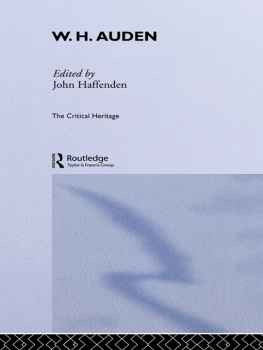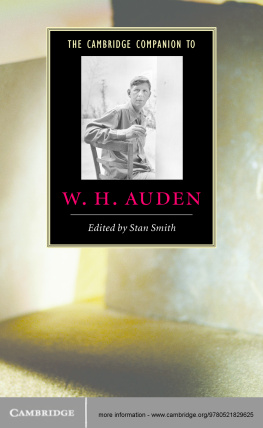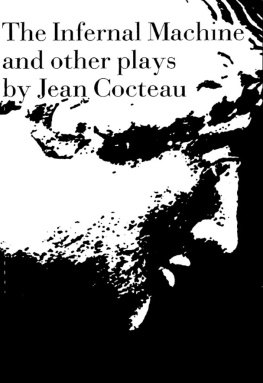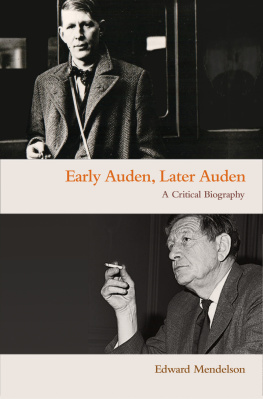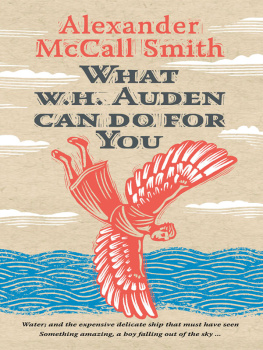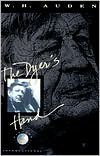Haffenden - W. H. Auden
Here you can read online Haffenden - W. H. Auden full text of the book (entire story) in english for free. Download pdf and epub, get meaning, cover and reviews about this ebook. year: 1983, publisher: Routledge, genre: Art. Description of the work, (preface) as well as reviews are available. Best literature library LitArk.com created for fans of good reading and offers a wide selection of genres:
Romance novel
Science fiction
Adventure
Detective
Science
History
Home and family
Prose
Art
Politics
Computer
Non-fiction
Religion
Business
Children
Humor
Choose a favorite category and find really read worthwhile books. Enjoy immersion in the world of imagination, feel the emotions of the characters or learn something new for yourself, make an fascinating discovery.
W. H. Auden: summary, description and annotation
We offer to read an annotation, description, summary or preface (depends on what the author of the book "W. H. Auden" wrote himself). If you haven't found the necessary information about the book — write in the comments, we will try to find it.
W. H. Auden — read online for free the complete book (whole text) full work
Below is the text of the book, divided by pages. System saving the place of the last page read, allows you to conveniently read the book "W. H. Auden" online for free, without having to search again every time where you left off. Put a bookmark, and you can go to the page where you finished reading at any time.
Font size:
Interval:
Bookmark:

W.H. Auden paid little heed to reviews of his work, and evidently felt little respect for his reviewers (with exceptions including Geoffrey Grigson and Edmund Wilson whom he admired). ()
He was truly unhappy when forced to listen to people expressing at length an opinion about his work (Usually they praise you for the wrong reasons). And he did not take kindly to any criticism. What he liked, after having given us a new poem to read, was a simple Good, very good. Its fun! Then he would nod, completely satisfied or so it seemed. (During the last years, the critics were often hostile to him, donkeys kicking or trying to kick the aging lion.) He knew his value and did not need much support from the outside.
Audens self-assurance began early. Even while up at Oxford in the later 1920s, he pronounced to Christopher Isherwood that Poetry must be classic, clinical and austere. ().
The periodical publication of this play, Paid on Both Sides, had not gone unobserved: it provided William Empson with the opportunity to exercise his critical skills in an article concluding that the charade has the sort of completeness that makes a work seem to define the attitude of a generation (No. 1). In turn, F.R. Leavis used Empsons essay as a stalking-horse to subvert what he considered an essential uncertainty of purpose and of self.
Naomi Mitchison, who had been introduced to Audens poetry by his Oxford contemporary Richard Goodman, tried to give the lead to favourable criticism by publishing her review of Poems significantly entitled The New Generation ) Although she also proselytized for Auden among her fellow critics, she could not help but set a pattern of ambiguous affirmation:
Reading Audens Poems I am puzzled and excited. The very young, it seems, admire and imitate him. Dare I spot him as a winner? He is wantonly obscure sometimes. The Charade which opens the book is curiously impressive. But there are passages in the middle which seem as if they could only be understood by a psychoanalyst.
Auden responded to her review,
Thanks awfully for your letter and the very kind review. Any reviewer who tells people to buy the book has said the right thing.
I dont honestly think that psycho-analytic knowledge would help critics of Paid on Both Sides at any rate emotionally,
adding in a postscript, The Listener Book Chronicle says: As for Mr Auden we dare not even hazard a guess what his book is all about. Am I really so obscure. Obscurity is a bad fault. ()
The Cambridge periodical Granta (28 November 1930) followed Mrs Mitchisons lead by hailing Audens poems as a major break with forebears in an article headed The New Gang:
The pretty imagery of the Georgians does not hold their poetry together; the symbolism of Lawrence or Mr. Eliot, however applicable it may be to our age in general, remains, after all, a personal symbolism, and the symbolism of a generation now middle-aged. Part of the satisfaction, then, to be got from reading Mr. Audens poems is derived from the completeness, and hence the realness of his picture.
Death of the old gang is very positively required throughout the poems; not a mere retreatism.
Both Dilys Powell (No. 3), even though she registered excitement about Poems, and Dudley Fitts echoed Naomi Mitchisons comments on obscurity. Fitts in particular found himself baffled and irritated by verses that could reduce themselves to a prosaic iteration of incoherencies (No. 8).
In his autobiography World Within World (1951), Stephen Spender emphasizes Audens posture of detachment and clinicality in his early poems, and their arbitrary qualities. () That feature of clinical detachment first won most praise from Louis MacNeice in Oxford Outlook (No. 5), while Audens putative intellectual arbitrariness (which seems curiously at odds with intellectual clear-sightedness) earned severe comment from F.R. Leavis (No. 6).
Again, Spenders autobiography categorically states that Auden rejected, quietly and without fuss, the moral views of both his preceptors and his fellow undergraduates, () What appears to be a late recension on Audens part in no way tallies, however, with the evidence available to Michael Roberts in December 1930 Mr. Auden laments virtues once purposeful, necessary to life, now revered as decorations, accomplishments, independent and meaningless Virtues (No. 4) and should perhaps be attributed to Audens continuing process of changing his views which so many critics intolerantly remarked in the years after 1940. Even on its own terms, however, Poems does show some disconnection between sensibility and technique, an aspect which the TLS shrewdly remarked, and which F.R. Leavis later perceived in terms of Audens blend of surface poise and fundamental self-mistrust. Leavis alerted his readers to what he saw as Audens profound inner disturbance a tension of impulsive life too urgent and shifting to permit him the sense of intellectual mastery.
In sum, while favourable critics thrilled to the new poets classicism, his detached clinicality of manner, and his introduction into verse of contemporary, possibly sinister and subversive, symbols and subjects disintegrating industrialism, climbing, exploring, spying, plotting others saw the elements of arbitrariness in his work as aspects of an artistic vision lacking in definition and coherence. The consensus of positive criticism at least greeted Auden as the harbinger of a long-awaited poetry which might surmount the unsatisfying views of T.S. Eliot, D.H. Lawrence and the Georgians the harbinger, indeed, of a new psychological and political mood and awaited his development with bated interest.
Shortly after the publication of Audens Poems, John Lehmann found in a fellow poet and critic, Michael Roberts, a colleague who might share his growing belief that they and their contemporaries formed a revolutionary movement in the arts, with the consequence that they worked to publish an anthology presenting all of us in some way as a front , so that the public, notoriously sluggish in its appreciation of individual poets, should be obliged to sit up and take notice. () Under Roberts editorship, New Signatures appeared in February 1932 from the Hogarth Press, the imprint of Leonard and Virginia Woolf.
All the contributors had already appeared either in periodicals or in their own books Auden, John Lehmann, Cecil Day-Lewis, William Plomer, Stephen Spender; Day-Lewiss Transitional Poem, for example, had forerun Audens Poems by a margin which enabled the Poetry Review (November-December 1930) to remark, Mr. Audens work recalls that of Mr. Day-Lewis. Michael Robertss Preface concentrates perhaps rather wilfully on the manner in which these New Signatures poets had overtaken the obsolete language and technique of their predecessors. Indeed, the volume does not fully deserve the apocalyptic status which literary history has commonly given it, although the public response certainly matched the mood of the blurb Lehmann had first sent to Julian Bell: ()
These new poems and satires by W.H. Auden, Julian Bell, Cecil Day-Lewis, Stephen Spender, A.S.J. Tessimond, and others, are a challenge to the pessimism and intellectual aloofness which has marked the best poetry of recent years. These young poets rebel only against those things which they believe can and must be changed in the postwar world, and their work in consequence has a vigour and width of appeal which has long seemed lacking from English poetry.
T.S. Eliot had favoured his work, but Auden had long schooled his own contemporaries such as Spender and Day-Lewis and found himself elected the proponent, if not the leader, of a group which had willy-nilly determined to revoke and overtake the work of an older generation which included Eliot himself. New Signatures served to make the public perceive the group as making common cause to a degree perhaps greater than any of its participants would have reckoned at the time, though they did have in common the fact that they wrote out of political sentiments and )
Font size:
Interval:
Bookmark:
Similar books «W. H. Auden»
Look at similar books to W. H. Auden. We have selected literature similar in name and meaning in the hope of providing readers with more options to find new, interesting, not yet read works.
Discussion, reviews of the book W. H. Auden and just readers' own opinions. Leave your comments, write what you think about the work, its meaning or the main characters. Specify what exactly you liked and what you didn't like, and why you think so.

